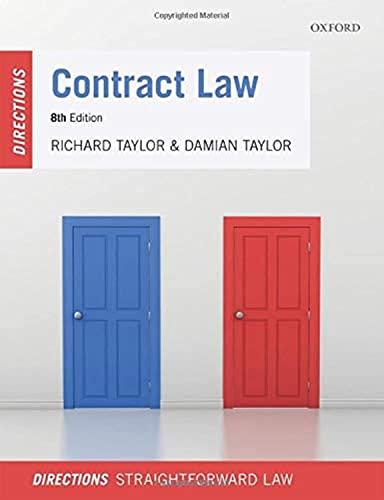Question
Police powers refers to: the state's authority to regulate the health safety and welfare of it's citizens local police agency authority a police officers authority
- "Police powers" refers to:
the state's authority to regulate the health safety and welfare of it's citizens
local police agency authority
a police officers authority to make an arrest
the authority of state police to monitor the roads
2.Law made by administrative agencies are called
rules or regulations
treatises
precedent or stare decisis
federalism
3.Title VII of the Civil Rights Act of 1964 prohibits discrimination in
employment practices
consumer finance
tort cases
family law practices
4.Statutory law is created by
legislatures
common law
constitutions
the courts
5.Substantive law refers to
the merits of a claim, case or action
the procedure used to carry out laws
the procedures used by the Supreme Court
the goal of a law
6.List three sources of primary law.
Group of answer choices
constitutions, statutes, common law
constitutions, common law, restatements
constitutions, statutes, legal encyclopedias
constitutions, state laws, treatises
7.What is due process?
Group of answer choices
fairness in government action
a form of legal realism
part of the Bill of rights
the collection of fines
8.The Bill of Rights refers to
Group of answer choices
the first ten amendments to the U.S. Constitution
the 13th, 14th, and 15th amendments tot he U.S. Constitution
the first amendment to the U.S. Constitution
all the amendments to the U.S. Constitution
9.Federalism is a structure of government where:
Group of answer choices
federal and state governments coexist and share power
federal and state governments each try for as much power as possible
states retain certain rights as determined try the state, regardless of federal law
states must first ask the federal government for authority to take action
10.Under the doctrine of stare decisis, court decisions rely on
Group of answer choices
judges to use past decisions to inform current decisions
following the rules of the constitution of the land
cost benefit analysis of future gains
judges to make new rulings
11.Laws made by government agencies are called
Group of answer choices
rules or regulations
precedent
judge's rulings
stare decisis
12.The rule of law
Group of answer choices
holds people to the same standard
allows the wealthy to evade the law
is nota predicable way to enforce the law
does not rely on precedent
13.Under the U.S. constitution, ex-post facto laws
Group of answer choices
are prohibited
are permitted
are permitted, but not often
create uncertainty
Step by Step Solution
There are 3 Steps involved in it
Step: 1

Get Instant Access to Expert-Tailored Solutions
See step-by-step solutions with expert insights and AI powered tools for academic success
Step: 2

Step: 3

Ace Your Homework with AI
Get the answers you need in no time with our AI-driven, step-by-step assistance
Get Started


